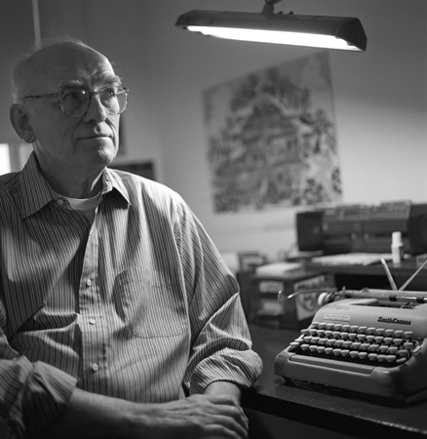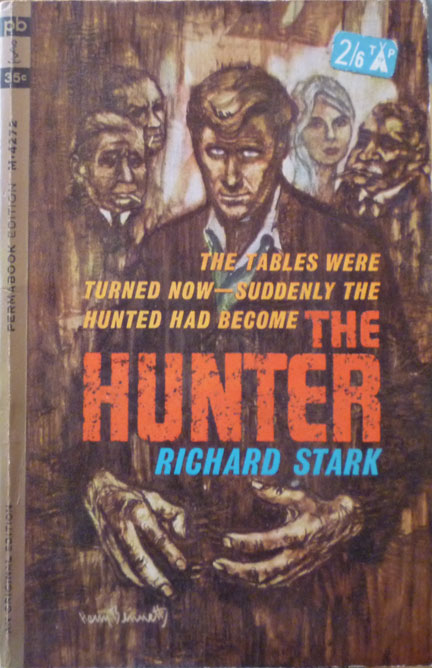“The unusual and tragic career of Leon Fleisher has always been one of the great classical-music mysteries of the age. Widely regarded in the 1950s and 1960s as this country’s finest native-born classical pianist, Fleisher stopped appearing in concerts in 1965 when a then-inexplicable nervous-system disorder left him unable to play with his right hand…”
Archives for February 1, 2011
TT: A little taste
Earlier today I posted about the foreword that I’m writing for the University of Chicago Press’ upcoming uniform-edition versions of Flashfire and Firebreak, two novels about Parker, the professional criminal, that were written by Donald E. Westlake under the pseudonym of Richard Stark. I sent the finished foreword off to Chicago this morning. Here are the last two paragraphs.
* * *
 When I first started reading about Parker, I thought of the words of Dostoevsky’s Ivan Karamazov: “If you were to destroy in humanity the belief in its immortality, not only love but every vital force for the continuation of earthly life would at once dry up. Moreover, then nothing would be immoral any more, everything would be permitted, even cannibalism.” Up to a point, that applies to Parker, a man to whom nothing but amateurishness is immoral. Even more to the point, though, is Liliana Cavani’s 2002 film version of Ripley’s Game, in which these words are put into the mouth of Tom Ripley, Patricia Highsmith’s anti-hero: “I lack your conscience and when I was young that troubled me. It no longer does. I don’t worry about being caught because I don’t believe anyone is watching.”
When I first started reading about Parker, I thought of the words of Dostoevsky’s Ivan Karamazov: “If you were to destroy in humanity the belief in its immortality, not only love but every vital force for the continuation of earthly life would at once dry up. Moreover, then nothing would be immoral any more, everything would be permitted, even cannibalism.” Up to a point, that applies to Parker, a man to whom nothing but amateurishness is immoral. Even more to the point, though, is Liliana Cavani’s 2002 film version of Ripley’s Game, in which these words are put into the mouth of Tom Ripley, Patricia Highsmith’s anti-hero: “I lack your conscience and when I was young that troubled me. It no longer does. I don’t worry about being caught because I don’t believe anyone is watching.”
Like Ripley, who is a real sociopath, Parker has no conscience. Somehow, though, I doubt that has ever troubled him. I think he got up one morning, decided for reasons known only to himself that no one was watching except for the cops, and decided to act accordingly. Nor do I think there was anything dramatic about his decision, no Farewell remorse…evil be thou my good moment to stun the groundlings. And that’s what makes Parker so interesting, so seductive, and so wholly unlike most of the rest of us: he just doesn’t care, and never did.
TT: I’ll work it in somewhere
In addition to presenting my first play tonight at Rollins College in Florida, I have to write and file two Wall Street Journal columns before flying up to New York on Saturday morning to see a press preview of Pete Gurney’s new play. I’m also working on the fourth chapter of Black Beauty: A Life of Duke Ellington, which is about two thousand words away from being done. I just started writing a description of the Cotton Club, the mob-owned Harlem nightspot where Ellington and his band took up residency in 1927, and the kitchen table of our borrowed Florida condo is piled high with all sorts of relevant books.
 That is, needless to say, plenty to do, but I also want to knock out yet another piece this week. The University of Chicago Press has asked me to write a preface for Flashfire and Firebreak, two of the upcoming volumes in its uniform edition of the Parker novels. Regular readers of this blog will know what and whom I’m talking about, but for those of you just joining us, Parker is the professional thief about whom Donald E. Westlake published twenty-four novels under the pseudonym of “Richard Stark” between 1962 and his death in 2008. Several of them were turned into films of widely varying quality, the best remembered of which is John Boorman’s Point Blank, in which Lee Marvin played Parker.
That is, needless to say, plenty to do, but I also want to knock out yet another piece this week. The University of Chicago Press has asked me to write a preface for Flashfire and Firebreak, two of the upcoming volumes in its uniform edition of the Parker novels. Regular readers of this blog will know what and whom I’m talking about, but for those of you just joining us, Parker is the professional thief about whom Donald E. Westlake published twenty-four novels under the pseudonym of “Richard Stark” between 1962 and his death in 2008. Several of them were turned into films of widely varying quality, the best remembered of which is John Boorman’s Point Blank, in which Lee Marvin played Parker.
 The books themselves were long known only to the most assiduous of mystery buffs, in part because many of them were originally published as paperback originals, and it took years for them to find a wider following. Today, though, the Parker novels are now regarded as classics of their genre, and the University of Chicago Press is currently in the process of reprinting them all in batches of two or three. Each batch features a preface written by a longtime admirer of Westlake’s work, and I’ve been tapped to supply one for Flashfire and Firebreak.
The books themselves were long known only to the most assiduous of mystery buffs, in part because many of them were originally published as paperback originals, and it took years for them to find a wider following. Today, though, the Parker novels are now regarded as classics of their genre, and the University of Chicago Press is currently in the process of reprinting them all in batches of two or three. Each batch features a preface written by a longtime admirer of Westlake’s work, and I’ve been tapped to supply one for Flashfire and Firebreak.
The piece is due next Tuesday, but I want to try to get it into the can before going to New York. I have a birthday coming up on Sunday and Mrs. T follows suit next Thursday, and we’d really like to kick back and relax, so I started drafting my essay yesterday morning and hope to wrap it up and send it off some time tomorrow.
And why am I telling you all this? Because I’m bragging. My admiration for Westlake is extravagant–it was one of the not-so-minor disappointments of my life that I never got to meet him–and I consider it a great honor to have been asked to write about his Parker novels for the uniform edition. I’ve only written two such retrospective prefaces in the past, for new editions of Elaine Dundy’s The Dud Avocado and Paul Taylor’s Private Domain: An Autobiography. I think this assignment ranks right up there, don’t you?
TT: Almanac
“Of all tyrannies, a tyranny sincerely exercised for the good of its victims may be the most oppressive. It would be better to live under robber barons than under omnipotent moral busybodies. The robber baron’s cruelty may sometimes sleep, his cupidity may at some point be satiated; but those who torment us for our own good will torment us without end for they do so with the approval of their own conscience.”
C.S. Lewis, God in the Dock
